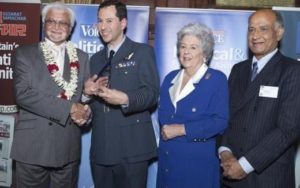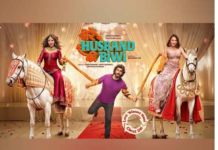Thrown out by Idi Amin from Uganda in 1972 with nothing but his clothes and £ 50.00 in his pocket Kanti Nagda vowed to ease the suffering of his fellow refugees in an alien and unfamiliar land. With youth on his side, he immediately started a Drop-in Centre in North Harrow where elderly Ugandan Asians with nowhere to go could socialise out of the cold.
He formalised the drop-in Centre by founding the Anglo-Indian Circle Charity and the Centre flourished for many years with 100-150 people regularly benefiting from its cultural and religious activities.
“I got involved in social activities, cultural organisations, and race relations. “I was a pioneer of Harrow Community Relations at the time. Discrimination was very rife. To the extent that the politicians in Harrow were saying ‘do not come to our borough, we are oversubscribed. There are no jobs, no schools, and no houses for you.’
We fought a number of discrimination cases in Harrow.”
He spent all his spare time working for charities assisting people and eventually got a job at Harrow Council as a social worker in 1982.The Council recognised his unique initiatives on refugee and minority problems and seconded him on various projects to help new immigrants settling in Harrow.
Meals on Wheels serving 100 vegetarians a day was soon started by him, in spite of a challenge by the then Leader of the Harrow Council, as was a homeless hostel in Harrow Weald. He was also one of the founders of the Harrow Race Relations Council.
He said that an early challenge was to overcome prejudicial barriers in the community work he was doing. He had high barriers to climb over; the then the Leader of Harrow Council said that ‘They (Asians) would get vegetarian meals-on-wheels over my dead body.’
Kanti challenged Harrow Council when they were checking the passports of children. “When the children wanted to get admission in the schools, the council was checking their passports. Now the rule of the nation is that if you are under 16, you should be educated free. It does not matter where you come from. For these people to check passports was not on. We challenged them and, in the end, they backed down. It was a struggle fighting and challenging lace curtain discrimination.”
Kanti notes that now, 40 years ago, the behaviour of local councils is not as it was then. “Today, they accept refugees from all over the world. Now things are different, but we had to fight,” he says, nodding and remembering.
In 1982, the Charity through his efforts had purchased a building for £45000 where regular activities for over 100 elderly took place, including a Day Care Centre for the disabled.
Named as the Sangat Centre, its beneficiaries now include a vast array of nationalities as it moved away from its original Ugandan roots.
Meanwhile with the Charity activities growing rapidly he took early retirement from the Council in 1994 to focus on his beloved charity.
Sangat soon started specialising in free Legal Advice on issues of Welfare, Housing, Immigration, Race Relations and Matrimonial and demand for its services rocketed from all over the UK. Given the very expensive nature of UK Lawyers, demand from the citizenry continued to escalate for this free service, which included legal representation at tribunals and courts.
A new larger building was desperately needed and in 2001and 2002 Kanti worked tirelessly to raise £700k for the building half of which came from the Millennium Commission.
The new building was opened in 2002 by Prince Edward and Countess of Wessex. Going from strength to strength the Sangat Centre today provides legal advice and representation to at least 1500 people/annum with at least 25,000 individuals advised over the last 15 years. A nominal charge for legal services was introduced in 2013 to make the service more self-sufficient. From a standing start of zero, the Anglo-Indian Circle Charity today boasts of a balance sheet in excess of £1.0m entirely raised through the efforts of Kanti and his team.
 Kanti Nagda was given his award by are Baroness Betty Boothroyd, former
Kanti Nagda was given his award by are Baroness Betty Boothroyd, former
speaker of the House of Commons
Kanti explained that challenge was all about “building Sangat Community Centre, without a penny from the local council, and having the Royal seal; the Centre’s opening ceremony was performed by Their Royal Highnesses the Earl and Countess of Wessex.
In addition to his other considerable charitable activities, Kanti served as the Secretary General of Confederation of Indian Organisations (UK) from 1974 to 1996, Treasurer of Harrow Community Relations Council, President of National Congress of Gujarati Organisation (UK), Chair of Harrow Refugee Forum, Chair of North West London Community Foundation, President of Greenford Lions Club, Trustee of Karma Yoga Foundation and continues to run the Sangat Centre and sits on a number of other charities.
In 1982, Kanti was one of the few Asians who got a place in DE Brett’s Handbook of distinguished people in British life and Marquis Who’s Who in the World in 1984. He was bestowed as the Asian of the year – Asian Achievers Award – in 2002 for Community Service and was awarded a National Political and Public Life Award (AAA) at the House of Commons by the then Speaker of the House of Commons, Baroness Betty Boothroyd.
He reveals, that the ability to overcome the difficulties posed through “the will to over-come all the hurdles; and there were many.”
Kanti’s journey started 46 years ago to help Ugandan Refugees fleeing from Africa has truly resulted in a National Charity benefiting thousands in the UK regardless of colour or religion.
He was delighted to be made a Member of the Order of the British Empire (MBE) in the 2020 Honours list.

Readers like you, make ESHADOOT work possible. We need your support to deliver quality and positive news about India and Indian diaspora - and to keep it open for everyone. Your support is essential to continue our efforts. Every contribution, however big or small, is so valuable for our future.












Dear Surinderji
Thank you very much.
Kanti Nagda
My best wishes to Kanti for work he has done he deserves the honour congratulations Kanti we all are proud of you It is late but you have done it.
This very inspiring story and Mr Nagda rightfully deserves the award. Today’s so called refugees at least some of them are different and probably won’t prove as good examples unlike the thousands of Ugandan Asians who made there life here, were loyal to UK and contributed to the economy